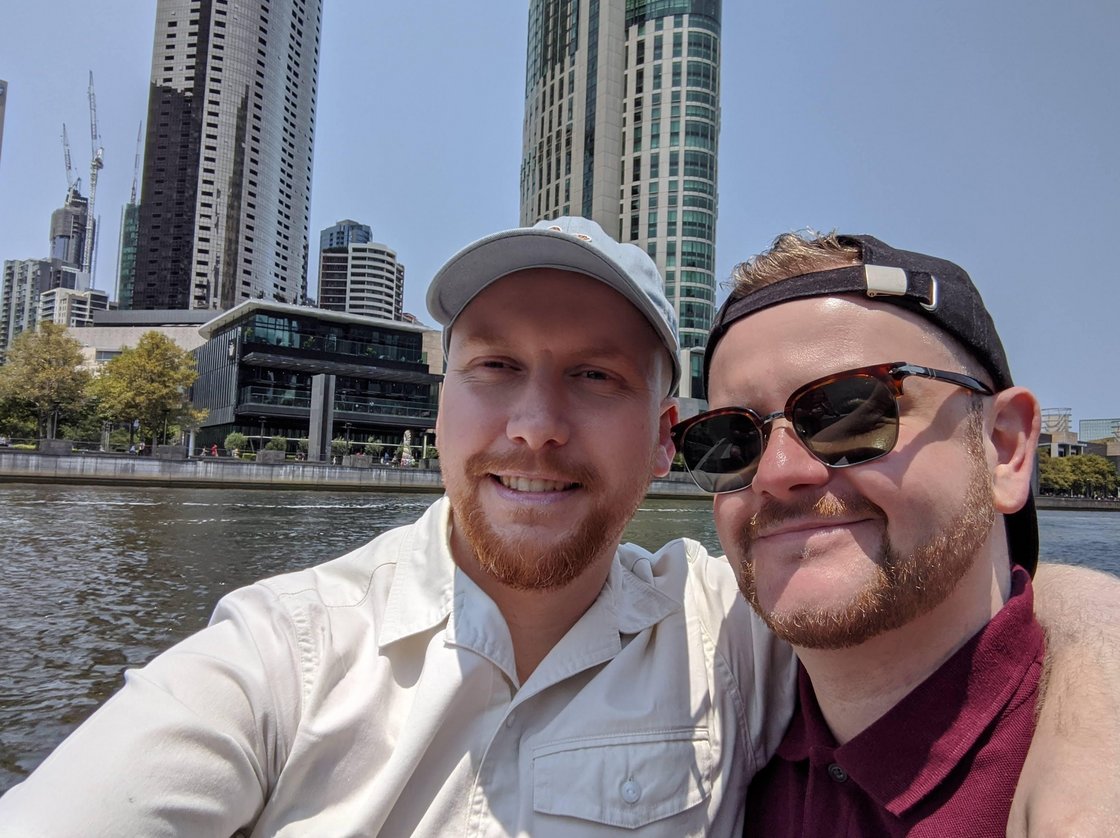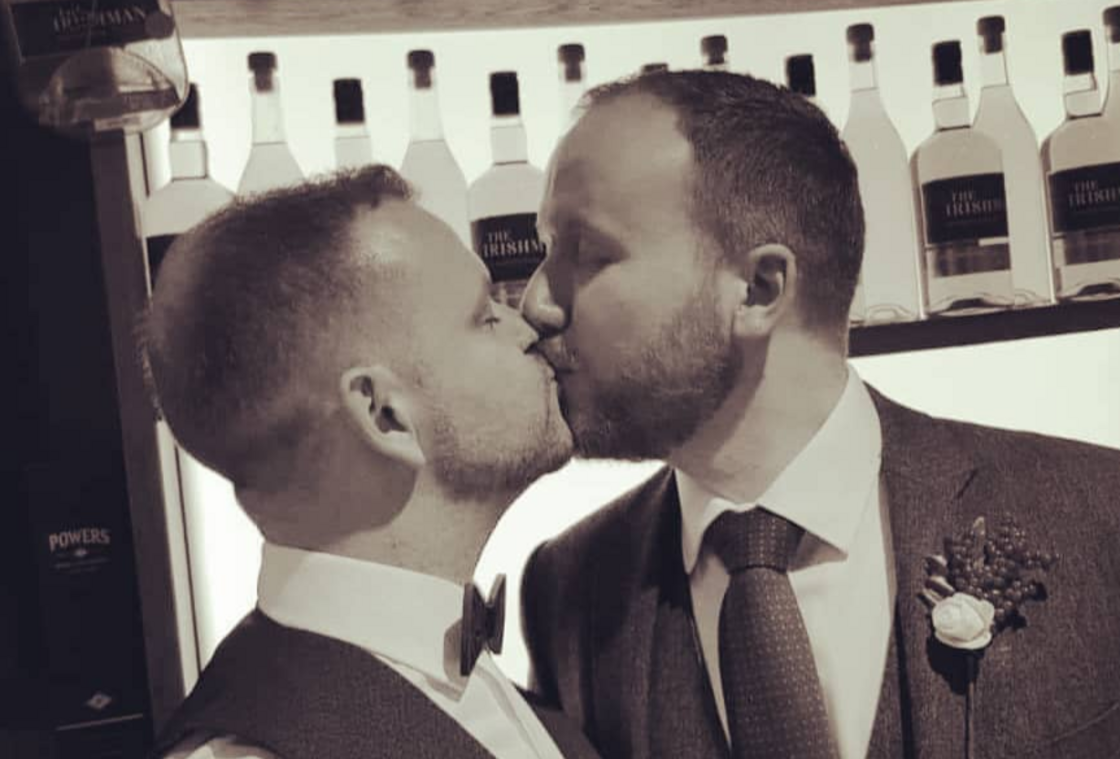In the early 2000’s the gay community in Dublin was not that big. Everyone seemed to know each other at least a of. Therefore, when Paul came over to Patrick seventeen years ago, and requested that he move, Patrick was able to recognize him as well as his long hair.
“I didn’t dance, and the Kate Bush song Wuthering Heights is a hard song to turn down-since I don’t like long hair.” Patrick laughs as he recalls the first time he met his soon-to-be husband. “A couple of weeks later, it’s my birthday on the 22nd of July, Paul shows up and has cut his hair to honor me. Since then, we’ve been in love.”
 Patrick left, with his partner Paul at the beach of Melbourne, Australia
Patrick left, with his partner Paul at the beach of Melbourne, Australia
Patrick Ryan joined Riot in 2021 as an advisor for diversity and inclusion for Europe as well as the Middle East, and Africa (EMEA) from the Dublin office in Dublin. However, when Patrick first met Paul, Patrick was a freshman college student with sociology degrees at Trinity College Dublin.
“Our entire relationship has been planned in the context of rapid social changes,” Patrick said. “In the beginning stages of my career, it would not be simple to be an out gay male and I wasn’t at ease in the idea. You’d be watching pronouns and consider your plans with coworkers.”
Patrick started his career in finance and banking beginning working for Citibank before moving onto State Street where he spent 12 years. As his professional career progressed and his relationships grew, so did his career.
Paul and Patrick were married after which they relocated to Poland. After a couple of years and a return to Ireland. In the meantime, their relationship grew stronger, however marriage wasn’t at the forefront.
“In the beginning stages of my profession, my relationships, when someone wanted to know whether I would get married, I’d have replied”no,”” Patrick said. “It was not something we could do. I’d always believed that I wouldn’t be able to accomplish it since I wasn’t sure that it would be possible to change over time.”
The couple could have travelled across the world to be married or formed an agreement of marriage contract, neither seemed right for them.
“It was just so important to us that we get married here in Ireland,” Patrick said. “Our life is here Our family and friends live here. and our families are in Ireland.”
in 2015 Ireland legally recognized same-sex marriage in 2015. Although it wasn’t the first country to adopt the marriage equality act but it was the first one where the issue was decided by a vote of the masses.
“A overwhelming majority supported legalizing marriage between same sex,” Patrick remembers. “You are asking a whole nation to take a decision regarding something that has a direct impact on me, my partner and my entire life. It felt important to be a part of this. It was like we were able to get married here, and we wanted to have it in this location which we did.”
 Patrick Paul and Paul during their day of wedding
Patrick Paul and Paul during their day of wedding
More than 1.2M Irish citizens voted in favor of the Marriage Equality Referendum, good more than 60% of votes. The law was enacted on the 16th of November, 2015. The first marriage of the same gender in Ireland was held the following day.
Votes like these are crucial occasions to celebrate equality and acknowledgement. But the changes the society experiences aren’t always as obvious as the majority of people voting for equality. The social shifts are more difficult to quantify , yet it’s identifiable all the same. It is evident in informal interactions, in manner in which people speak, in the way that organizations and individuals are able to make room for inclusion and learning.
“I remember the time I first moved to Poland I was talking about logistical aspects with my boss at that time, and we were talking about my boyfriend,” Patrick said. “I recall correcting them and saying that my partner was an older man. This was awkward. The conversation was okay, but there was something awkward that was evident and the conversation was over quickly. I can remember nearly feeling like I was pushed out.
“But when I returned after a couple of years there was something new,” Patrick continued. “The workplace was much more relaxed, more open and comfortable. I believe that’s been manifested in the shifts in society. People are more transparent to their interactions, and especially in the workplace.”
However there’s a long way to take. A lot of countries around the globe are locked out, if not in fact hostile, towards LGBTQor people with disabilities. Businesses have had to adapt. One of the first steps is to recognize that the company’s culture is a major issue to address-we have seen the process firsthand.
However, just like the society, businesses are able to evolve and it’s essential that they do this. Patrick’s main focus is on this.
“I reached a point in my life that I’m at peace in my own skin,” He said. “I did not have to go through the fear of coming out to work. However, I noticed that I had coworkers the similar age to me and who had children who were growing older and pondering their identities and sexuality. They were experiencing these coming out experiences as parents of straight cisgendered children and were asking concerns. What can I do? How can I communicate with my children? What do I do to support them? Thus, creating a resource to support them was a major goal for me.”
In this light, Patrick agreed to create and lead The Pride Network at State Street. At the same time Patrick was also involved in the co-founding of FuSIoN which is the Irish Financial Services Inclusion Network. FuSIoN is a consortium made up of Pride networks, which grew from the initial seven financial service banking institutions, to over thirty in the present. In his time in FuSIoN, Patrick led the Career & Professional Development pillar.
“It was necessary to be a reason and some kind of plan,” Patrick said. “Sometimes it’s the case that a Pride Network is only a event in June. For me it was imperative that if we decided to have this event it had to have more impact.”
The first event was called the ABCs of LGBT, bringing clarity to the words and terms that are used to define the diverse identities that comprise the various communities that comprise LGBTQ+. Through a partnership with the family-oriented organization of State Street, the Pride Network will participate in events at which teens or children are present. They will be able to buy Pride merchandise but, most importantly, they would have the chance to ask questions.
“Creating these networks and working closely with individuals, that’s the best way for us to be able to create significant changes” Patrick said. “I witnessed the impact of these events being felt within the organization. I believe there is a great possibility at Riot to take a similar approach and especially for EMEA.”
In order to be Riot, a business that is known for making the user experience the first priority it is essential to create an environment where everyone is welcomed and able to be who they are. The gamers we play with come from a number of communities and Rioters are no different. To reach out to all players needs an understanding within Riot to ensure it can be sure that Riot’s games remain as good as they could be, regardless of the place where they come from and who they are or what they are passionate about.
As a business, we’ve faced problems over the years. Assembling that these issues aren’t there does nothing to help anyone. Riot’s focus is on recognizing these problems and addressing them across the organization.
“When I began doing my research on Riot after I submitted my application to the organization, Kotaku’s reports about Riotand Neom were immediately found,” Patrick said. “But there was an actual recognition that we have come from a challenging area and we’ve experienced some negative experiences and we’re trying to get it fixed.’
“What impressed me about Riot was that they had an emphasis on inclusiveness and diversity.” the reporter continued. “I spoke with members of their D&I team and really wanted to collaborate with them. There’s a big challenge ahead in making Riot a global business fully inclusive. We have a large team, particularly in the scale of Riot in general, and we’re committed to expanding all employee networks to ensure everyone is in the room and feels accepted in Riot.”
At Riot we refer to the RIGs of the employee networks, which stands of Riot Inclusion Groups. They are places for minorities and marginalized communities, as well as their supporters to meet to discuss shared experiences, and act as an advocate for the communities within Riot. There are currently seven
- Filipinos In Riot who strengthen, unite as well as celebrate Filipinos at Riot as well as in the gaming community.
- Rainbow Rioters which promotes LGBTQIAand communities, as well as products available at Riot and beyond.
- Riot Alliance of Diverse Genders that drives Riot to become a space where every gender can flourish and are reflected within Riot’s offerings.
- Riot Noir who amplifies black voices and increases the representation of black people at Riot as well as outside of our products.
- Riot Unidos that offers a safe and supportive space that is a safe haven for LatinX Rioters as well as their allies through advocating for recognition, cultural bonding and outreach to the community.
- Veteran@Riot who assist the Riot veterans and allies in expanding representation across the gaming industry.
- Asian as well as Pacific Islanders at Riot, our newest RIG that supports Asian as well as Pacific Islanders by sharing experiences and increasing the representation of gaming.
Patrick is one of the Rioters who is determined to build out these resources and ensuring that the groups have an international focus. They cover a variety of communities and identities and often come together to celebrate the diversity of backgrounds. In Pride Month Rainbow Rioters led in directing our Pride strategy as well as coordinated participation in Pride parades, and also took the time to recognize the whole LGBTQand community.
“There are many things that must change or be made better in the interest of LGBTQ persons,” Patrick said. “The debates are happening, but homophobia is still a problem within the culture, and in some cases written into law. There’s still violence against LGBTQ people, and there remains discrimination. Pride is a chance to connect people and start conversations. The importance of friendship is paramount If you attend the Pride celebration during Pride then you must remain there throughout the year. Be loud. Be vocal. Get involved. Make a statement. This is what the LGBTQ community needs, and we’re in need of it all throughout the year and not only for Pride.”